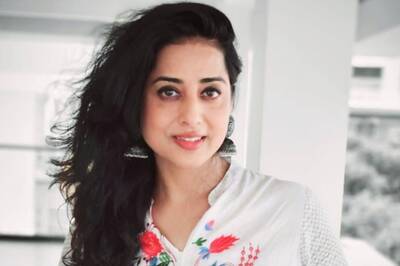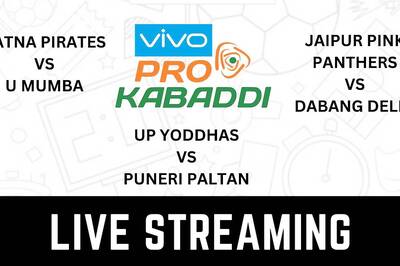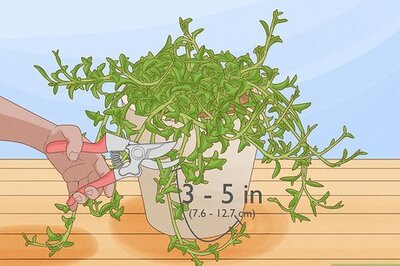
views
When former Sri Lankan president Mahinda Rajapaksa visited India a few weeks ago, he claimed that the UPA government supported the Lankan government in the war to eliminate the LTTE in 2009.
The comment evoked strong political reactions in Tamil Nadu as the Dravida Munnetra Kazhagam (DMK) was a part of the UPA and has publicly termed Rajapaksa a "mass murderer". It claims to have vehemently opposed the war in which thousands of Sri Lankan Tamils were killed.
The DMK hit back and accused Rajapaksa of making the comment at the behest of the ruling BJP. In fact, it alleged that the comment was orchestrated by the BJP leadership with the help of Subramanian Swamy.
The relationship of India and the DMK with Sri Lanka and the LTTE has a long, clandestine history. It is a highly sensitive issue, but what's interesting is the timing of Rajapaksa's comments.
It comes in the backdrop of MK Stalin's renewed pitch, projecting his party and himself as the custodian of Dravidian and Tamil values and a categorical ideological opposition to the BJP and Narendra Modi.
By taking this position, the battle for the DMK in 2019 is not a narrative against a local opponent, to date it was the AIADMK, but a larger national and ideological opponent - the BJP. This is why the insinuation of the DMK is that Rajapaksa is being used by the Centre to destroy its stature as the party protecting the Tamils.
Stalin hopes to build himself as the leader of the Tamils, like his father the late M Karunanidhi, and portray the AIADMK, which has no strong leadership after the demise of J Jayalalithaa, as one that has no political stature and has survived with the help of the BJP.
This, in effect, means that the DMK argues that any political party which believes in Dravidian political values has to gravitate towards it for an alliance. This is where it's credibility on the Sri Lankan Tamil issue is important and it's that credibility that’s been challenged by Rajapaksa’s comments.
In other words, it's not an electoral issue, but one that has ideological implications and impact on the stature of the DMK and Stalin.
The stature is essential to get smaller caste-based Tamil political parties to endorse his leadership and join in an alliance led by the DMK.
For instance, in the case of the VCK, a party Stalin has approached, it has a powerful Scheduled Caste base in northern Tamil Nadu and has been a staunch supporter of the LTTE. Accusations over what the DMK and UPA did or did not do during the war may not be a deal breaker, but certainly is a soft spot.
The case is the same with virtually every other Tamil party. These are parties that have opposing caste bases at the grassroots level, but have united, in the past, under a larger Tamil umbrella.
For instance, the PMK has a strong Vanniyar caste base and the VCK a Scheduled Caste base in northern Tamil Nadu. The two castes have often had serious clashes and friction but they have been part of an alliance under the DMK and united on the Sri Lankan Tamil issue.
It is noteworthy that the Congress is certain to be part of the alliance with the DMK, but its electoral standing in Tamil Nadu would only make it an equal to a small party in the state.
Further, after the demise of Karunanidhi and Jayalalithaa, the smaller parties also nurture an ambition to emerge as forces that could challenge the DMK-AIADMK bipolar structure in the state.
So far, they had to ally with Karunanidhi or Jayalalithaa to make an impact in terms of seats. They will be keen to change that, for, if Stalin becomes king, their prospects are limited.
For instance, PMK leader and former Union minister Anbumani Ramadoss, unlike his father Ramadoss senior, who refused to contest elections, has projected himself as a potential chief minister. His party had contested the 2014 Lok Sabha elections in alliance with the BJP, and went alone in the 2016 Assembly elections.
Another example is Vaiko who leads the MDMK. He had to leave the DMK in 1992 because of his rivalry with Stalin.
On their own, these parties may not create an impact. But if they unite their forces against Stalin under one umbrella, the DMK could face trouble. These parties and leaders have the credibility to challenge the DMK grandstanding of being a custodian of the Tamil cause.
Given that the entry of actors Rajinikanth and Kamal Haasan could further fragment the electorate, Stalin needs a strong alliance to consolidate his position and ensure electoral arithmetic.
In fact, Stalin made the mistake of going it alone in the 2016 Assembly elections against Jayalalithaa and lost. It's proof that he needs an alliance to sweep Tamil Nadu.
Karunanidhi had the stature to bring these forces together, can Stalin do the same? This will be his big test, one in which he is up against Hindutva as an ideology and not just a traditional rival.
And, in this ideological battle, the opponents are certain to challenge the DMK claim as the most powerful Tamil force and Stalin needs allies to defeat them.
(The author is a senior journalist. Views are personal)




















Comments
0 comment